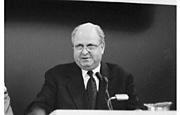In his trailblazing lectures on psychology, William James offers his students a teasingly ruthless introduction to the mechanistic theory of the mind. Take a frog, he says, and cut the connection between spinal cord and brain. The frog lives but fails to function; cut further and further within the brain itself, and it behaves more and more as a frog should behave; at last, only one essential ability is absent—the ability to respond to a new situation with new behavior.
These days there’s an eerie similarity between James’ frog and Mike Moore. Since the WTO’s debacle in Seattle last November, Moore has continued to function, going through all the motions required of a World Trade Organization director-general, flying incessantly from international economic conferences to top-level ministerial conclaves and affirming that the agency he heads is alive, well, and rapidly adapting to post-Seattle conditions. He announces progress on issues not addressed here and new initiatives pregnant with promise.
The trouble with this cheery message is that it doesn’t fit the facts. In speech after speech Moore cites four areas of “progress”: negotiations on lowering barriers to trade in agricultural products and services (“which together account for over two-thirds of world output”); easing the disruption free trade imposes on struggling economies; better access for poor countries’ products to rich countries’ markets; and “looking at ways to improve how the WTO works.”
Well, the first two items were already on the WTO agenda while the tear gas canisters were flying and have not budged since; lip service has been paid to lowering tariffs on poor-country goods (even by the US Congress), but implementation is still a long way off; and as for improvements to the WTO’s internal functioning, about all the evidence for that is a more user-friendly Web site.
The most extreme opponents of the WTO have always portrayed it as a secret cabal—sort of a Trilateral Commission staffed by the Gnomes of Zurich—manipulating the economic fate of the world to its own mysterious ends, unaccountable even to its own membership. Seattle revealed it as something less glamorous: yet another mechanism for the great powers to share out the economic spoils of global trade, but, unlike the World Bank or the International Monetary Fund, tricked out with an appearance of one-country, one-vote participatory democracy.
As long as the United States and the European Union maintained common cause, the WTO could keep up appearances. But for the last three years the two economic mega-powers have increasingly been at one another’s throats over trade in everything from beef to bananas, cinema to software. It was those divisions, not the shouts of protesters outside the Convention Center, that permitted their smaller and weaker “partners” to derail the US delegation’s locomotive.
With the WTO revealed to all as a mere facade for the great-power trade agenda, it lost not only its credibility but its usefulness to its masters. Both the US and the EU continue to bring charges and countercharges against one another through its cumbersome dispute-resolution mechanism, but since both have made it clear that each will only accept judgments in their favor, the whole procedure has come to resemble the charade WTO opponents have always seen it as.
Even more threatening to the organization is the accelerating trend toward countries negotiating their own bi-, tri-, and multilateral trade agreements narrowly focused on areas of mutual interest. It’s true that the decade-plus it took to negotiate each of the WTO’s various “rounds” was incentive enough for individual countries to try to work out problems between themselves, but the two-year paralysis leading up to the Seattle ministerial, in which members couldn’t even agree on an occupant for the largely ceremonial post of director-general, greatly accelerated the move toward local and regional problem solving.
Neither the drift toward regional trade blocs nor the increasingly edgy confrontation between the EU and the US would alone be cause for deep concern. Together they suggest a troubling direction for the future. If—when—the current unprecedented period of economic growth comes to an end, a world broken up into myriad overlapping trade zones overshadowed by a pair of antagonistic superpowers would be predisposed to fragmentation: self-protection not cooperation.
There’s enough analogy to the global situation in 1919-39 to trouble more than historians. In a “By Invitation” essay in the July 15 issue of The Economist, Fred Bergsten of the Washington think tank the Institute for International Economics pointed out the dangers inherent in such a patchwork of regional economic plans and treaties. And Bergsten is hardly a devotee of tightly centralized world trade policy; he was one of the experts called in to facilitate the formation of the multilateral Asia-Pacific Economic Cooperation group (APEC) in 1989.
Paradoxically, one of the WTO’s biggest challenges in recent years may turn out to be what saves its faltering hold on power. The admission of China to full membership would immediately return the WTO to prominence if not potency. China’s impact today on world trade is tiny; its potential impact is so great that the US and the EU may be forced to stop their squabbling in order to contain it. And there is no other institution so well placed as the WTO to try to do that.
More on WTO:
The legacy of Seattle’s WTO protest leaders.
External links:
• The WTO’s new, improved Web page
• A sample of Mike Moore’s boilerplate speech on the WTO
• Fred Bergsten’s Economist essay is available only to subscribers, but Bergsten’s views on the international economic scene are articulated in numerous essays available on the Institute for International Economics Web page: http://www.iie.com/








